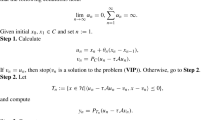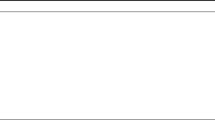Abstract
We consider linear-quadratic (LQ) control problems, where the control variable appears linearly and is box-constrained. It is well-known that these problems exhibit bang–bang and singular solutions. We assume that the solution is of bang–bang type, which is computationally challenging to obtain. We employ a quadratic regularization of the LQ control problem by embedding the \(L^2\)-norm of the control variable into the cost functional. First, we find a dual problem guided by the methodology of Fenchel duality. Then we prove strong duality and the saddle point property, which together ensure that the primal solution can be recovered from the dual solution. We propose a discretization scheme for the dual problem, under which a diagram depicting the relations between the primal and dual problems and their discretization commutes. The commuting diagram ensures that, given convergence results for the discrete primal variables, discrete dual variables also converge to a solution of the dual problem with a similar error bound. We demonstrate via a simple but illustrative example that significant computational savings can be achieved by solving the dual, rather than the primal, problem.


Similar content being viewed by others
References
Alt W, Schneider C (2015) Linear-quadratic control problems with \({L^1}\)-control cost. Optim Control Appl Methods 36:512–534
Alt W, Seydenschwanz M (2011) Regularization and discretization of linear-quadratic control problems. Control Cybern 40(4):903–920
Alt W, Seydenschwanz M (2014) An implicit discretization scheme for linear-quadratic control problems with bang–bang solutions. Optim Methods Softw 29(3):535–560
Alt W, Baier R, Gerdts M, Lempio F (2012) Error bounds for Euler approximation of linear-quadratic control problems with bang–bang solutions. Numer Algebra Control Optim 2(3):547–570
Alt W, Baier R, Gerdts M, Lempio F (2013) Approximation of linear control problems with bang–bang solutions. Optimization 62(1):9–32
Alt W, Schneider C, Seydenschwanz M (2015) Perturbation and regularization of linear-quadratic optimal control problems with bang–bang solutions. Technical report, Friedrich-Schiller-Universität Jena
Amman HM, Kendrick DA (1998) Computing the steady state of linear quadratic optimization models with rational expectations. Econ Lett 58:185–191
Borwein JM, Zhu QJ (2005) Techniques of variational analysis. Springer, Berlin
Burachik RS, Kaya CY, Majeed SN (2014) A duality approach for solving control-constrained linear-quadratic optimal control problems. SIAM J Control Optim 52(3):1423–1456
Büskens C, Maurer H (2000) SQP-methods for solving optimal control problems with control and state constraints: adjoint variables, sensitivity analysis and real-time control. J Comput Appl Math 120:85–108
Christiansen B, Maurer H, Zirn O (2010) Optimal control of machine tool manipulators. In: Diehl M, Glineur F, Jarlebring E, Michiels W (eds) Recent advances in optimization and its applications in engineering. Springer, Berlin, pp 451–460
Felgenhauer U (2003) On stability of bang–bang type controls. SIAM J Control Optim 41(6):1843–1867
Fenchel W (1949) On conjugate convex functions. Can J Math 1:73–77
Fourer R, Gay DM, Kernighan BW (2003) AMPL: a modelling language for mathematical programming, 2nd edn. Duxbury Press, Belmont
Haunschmied JL, Piétrus A, Veliov VM (2013) The Euler method for linear control systems revisited. In: Large-scale scientific computing—9th international conference, LSSC 2013, Sozopol, Bulgaria, June 3–7, 2013. Revised Selected Papers, pp 90–97
Hestenes MR (1966) Calculus of variations and optimal control theory. Wiley, New York
Huber PJ (1964) Robust estimation of a location parameter. Ann Math Stat 35(1):73–101
Ioffe AD, Tihomirov VM (1979) Theory of extremal problems. North Holland, Amsterdam
Kaya CY (2010) Inexact restoration for Runge–Kutta discretization of optimal control problems. SIAM J Numer Anal 48(4):1492–1517
Kaya CY, Noakes JL (2003) Computational algorithm for time-optimal switching control. J Optim Theory Appl 117:69–92
Kaya CY, Lucas SK, Simakov ST (2004) Computations for bang-bang constrained optimal control using a mathematical programming formulation. Optim Control Appl Methods 25:295–308
Kugelmann B, Pesch HJ (1990) New general guidance method in constrained optimal control, part 1: numerical method. J Optim Theory Appl 67:421–435
Luenberger DG (1969) Optimization by vector space methods. Wiley, New York
Maurer H, Oberle HJ (2002) Second order sufficient conditions for optimal control problems with free final time: the Riccati approach. SIAM J Control Optim 41:380–403
Maurer H, Büskens C, Kim JHR, Kaya CY (2005) Optimization methods for the verification of second order sufficient conditions for bang–bang controls. Optim Control Appl Methods 26:129–156
Mouktonglang T (2011) Innate immune response via perturbed LQ-control problem. Adv Stud Biol 3:327–332
Osmolovskii NP, Maurer H (2012) Applications to regular and bang–bang control: second-order necessary and sufficient optimality conditions in calculus of variations and optimal control. SIAM, Philadelphia
Schneider C, Alt W (2014) Regularization of linear-quadratic control problems with \({L}^1\)-control cost. In: Pötzsche C, Heuberger C, Kaltenbacher B, Rendl F (eds) System modeling and optimization. IFIP advances in information and communication technology. 26th IFIP TC 7 Conference, CSMO 2013, vol 443, pp 296–305. Springer, Berlin
Seydenschwanz M (2015) Convergence results for the discrete regularization of linear-quadratic control problems with bang–bang solutions. Comput Optim Appl 61:731–760
Tikhomirov V (2009) Lagrange principle and necessary conditions. Control Cybern 38:1589–1605
Veliov VM (2005) Error analysis of discrete approximations to bang–bang optimal control problems: the linear case. Control Cybern 34(3):967–982
Wächter A, Biegler LT (2006) On the implementation of a primal-dual interior point filter line search algorithm for large-scale nonlinear programming. Math Program 106(1):25–57
Werner J (1984) Optimization theory and applications. In: Vieweg advanced lectures in mathematics. Vieweg, Braunschweig
Acknowledgments
We would like to thank Radu Ioan Boţ und Regina S. Burachik for helpful discussions and also express our gratitude to the anonymous referees for valuable suggestions and comments.
Author information
Authors and Affiliations
Corresponding author
Rights and permissions
About this article
Cite this article
Alt, W., Kaya, C.Y. & Schneider, C. Dualization and discretization of linear-quadratic control problems with bang–bang solutions. EURO J Comput Optim 4, 47–77 (2016). https://doi.org/10.1007/s13675-015-0049-4
Received:
Accepted:
Published:
Issue Date:
DOI: https://doi.org/10.1007/s13675-015-0049-4




